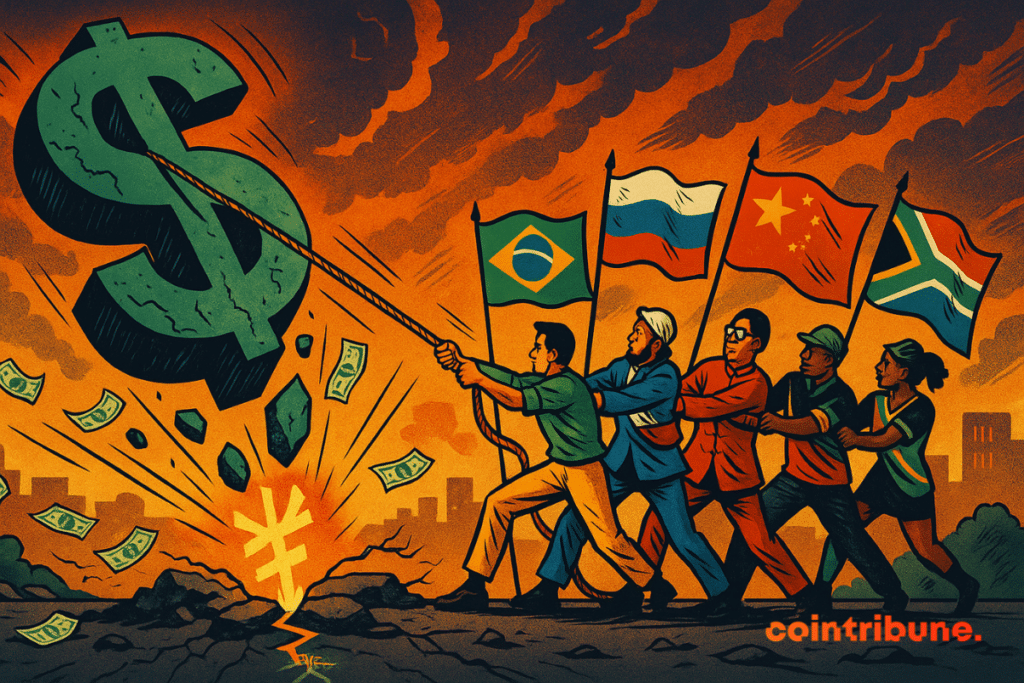13h05 ▪
5
min read ▪ by
As geopolitical rivalries rekindle, dedollarization is once again asserted as a lever of monetary sovereignty. Long a spearhead of this ambition, the BRICS seemed poised to challenge the economic order dominated by Washington. However, a strategic repositioning by Brazil, an influential member of the bloc, disrupts this trajectory. By ruling out the idea of a common currency, the country reshuffles the cards of an already fragile project, revealing the limits of monetary coordination in the face of economic power dynamics.


Realism Triumphs Over Monetary Idealism
While actively supporting the BRICS initiatives aimed at reducing dollar dependence, such as exploring alternative payment systems and gradually adopting blockchain technologies, Brazil has been more cautious regarding the feasibility of a common currency.
In a statement, Brazil’s director of monetary policy, Nilton David, broke the BRICS alliance momentum, announcing that no stock of assets denominated in the group’s currencies is currently substantial enough to compete with the US dollar.
Indeed, he asserted “that there is little chance this will change over the next decade”, referring to the US dollar’s dominance.
A statement heavy with meaning, especially coming from the country holding the rotating presidency of the BRICS bloc in 2025. This turnaround marks a clear retreat from Brazil’s historical positions, as it was once a fervent advocate for a monetary alternative to the dollar-centered system.
In light of this statement, several factors help understand the scope of this change in stance:
- The recognition of an economic reality: despite declared ambitions, no currency reserves or alternative system appears, in the short or medium term, able to effectively challenge the dollar’s place in international markets;
- A lack of internal cohesion within the BRICS: the very different approaches of members regarding monetary policy and reserve management make any collective initiative very difficult to coordinate;
- The absence of supranational governance: unlike the European Union with the ECB, the BRICS have no joint institution to steer a possible single currency, complicating any coherent dedollarization strategy;
- A persistent structural dependence: a large part of international trade, including that among bloc members, remains denominated in dollars. The transition would therefore be costly, lengthy, and technically complex.
In sum, by this declaration, Brazil seems to endorse a truth that many economists have been whispering for months: the dollar’s hegemony cannot be overturned by political will alone.
More than a joint project and symbolic declarations will be needed to erode its dominance.
A Global Political Context That Redefines Priorities
This strategic shift by Brazil takes place in a notably tense diplomatic context. Indeed, within the first 100 days of his second term, U.S. President Donald Trump threatened the BRICS with severe economic sanctions, notably through the imposition of tariffs as high as 150%.
This ultra-protectionist stance aims to punish the bloc’s initiatives related to the marginalization of the dollar in international trade. Although these threats have not yet been implemented, they weigh heavily on the political and economic calculations of the BRICS members BRICS.
This change in tone on Brazil’s side seems to reflect a willingness to de-escalate amid rising trade tensions with Washington. President Trump’s return has evidently cooled the eagerness for a frontal break.
Unlike Russia or China, Brazil remains economically very dependent on trade with the United States. Thus, this reality limits its room for maneuver and could explain this realistic reinterpretation of BRICS ambitions. In other words, it may not be an abandonment of dedollarization but a strategic slowdown motivated by the current situation.
While the Brazilian statement sounds like a retreat, it does not necessarily signal the failure of dedollarization. It could mark the beginning of a more cautious, longer, and more gradual phase where challenging the dollar’s hegemony will be done through peripheral adjustments rather than direct confrontation. Even if the BRICS’ single currency project seems abandoned, the alliance members will now have to contend with the headwinds of an unstable geopolitical environment and a renewed offensive of American unilateralism.
Maximize your Cointribune experience with our “Read to Earn” program! For every article you read, earn points and access exclusive rewards. Sign up now and start earning benefits.
Diplômé de Sciences Po Toulouse et titulaire d’une certification consultant blockchain délivrée par Alyra, j’ai rejoint l’aventure Cointribune en 2019.
Convaincu du potentiel de la blockchain pour transformer de nombreux secteurs de l’économie, j’ai pris l’engagement de sensibiliser et d’informer le grand public sur cet écosystème en constante évolution. Mon objectif est de permettre à chacun de mieux comprendre la blockchain et de saisir les opportunités qu’elle offre. Je m’efforce chaque jour de fournir une analyse objective de l’actualité, de décrypter les tendances du marché, de relayer les dernières innovations technologiques et de mettre en perspective les enjeux économiques et sociétaux de cette révolution en marche.
DISCLAIMER
The views, thoughts, and opinions expressed in this article belong solely to the author, and should not be taken as investment advice. Do your own research before taking any investment decisions.

